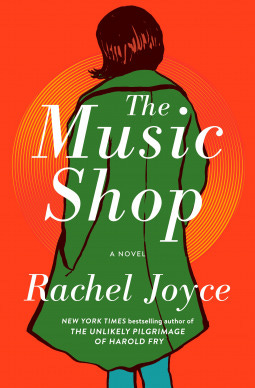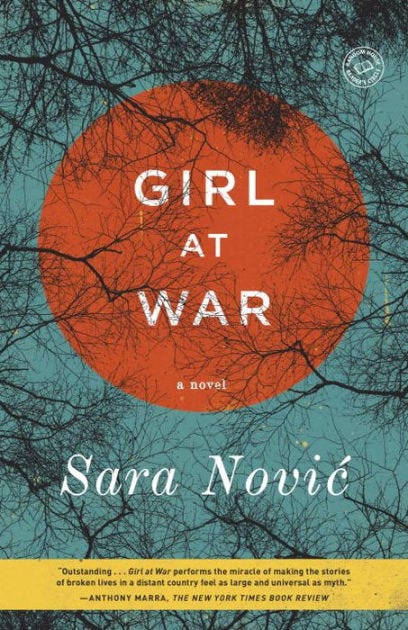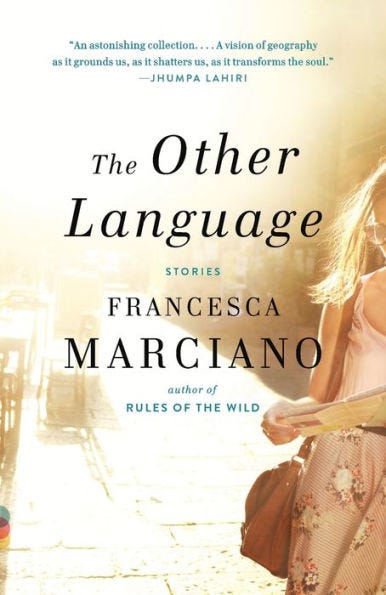Let's face it, new books get all the attention, with promotional campaigns, author book tours, discounts, etc. If you happen to miss a book in its first months/year, there's a good chance you won't encounter it, at least not on Bookstagram, BookTok, BookTube, or on a bookstore's display or website. We've all missed great books in this way, only to discover them later. So once in a while we need to explore the backlist of books. We usually do it when we discover the current book by an author and then explore their previous books. The other way is recommendations by trusted friends, whether in real life or on social media. Today I hope to be that friend.
When Rachel Joyce's The Music Shop came out in 2017, I thought it sounded like a good nostalgic read. But then I forgot about it, and it hasn’t shown up in my social media feeds since. I recently came across it at a library book sale and thought, “Oh yeah, I wanted to read this!” Snagged it and actually read it.
In this post I also share three other books from the last decade that I also loved: a book about war and trauma by a Croatian American; a story of two immigrants learning a new language and culture by a Japanese Australian; and a stylish and insightful short story collection by an Italian who writes in English. Four very different books that are worth your attention.
Rachel Joyce made a big impression with her debut, The Unlikely Pilgrimage of Harold Fry, in 2012. She followed it up with Perfect (2014) and then a parallel story of Harold Fry’s adventures, The Love Song of Miss Queenie Hennessy (2015). Her fifth and sixth books were Miss Benson’s Beetle (2020) and the third chapter in the Harold Fry trilogy, Maureen (2023), which focused on his wife’s story. Joyce’s specialty is charming, very British stories of love and friendship.
I recommend her fourth novel, The Music Shop (2017), a book for music lovers who remember the days of neighborhood record shops run by eccentric owners. It would also satisfy the curiosity of younger folks who regret that they never experienced the glory days of vinyl in the 1970s and most of the 1980s. (I frequented a small shop called Moby Disc in the suburbs of Los Angeles that stocked mainstream music, British imports, and used albums. I was there to hunt through the latter two sections.)
The Music Shop is the story of Frank, who owns a uniquely ragged and disorganized record shop on a rundown cul-de-sac off the main street. His neighbors are half a dozen other businesses run by people who love what they do but aren’t very good at it. Like Frank, all the owners are eccentric, and over the years they’ve created a little community of misfits. Frank’s shop stands out for two reasons. It’s1988 and CDs are all the rage, but he refuses to stock them. And he has an uncanny gift for knowing what song or album a customer needs when they’re heartbroken, depressed, confused, or lonely. Frank is battling with record labels and distributors over his insistence on selling nothing but vinyl even though everyone keeps telling him it’s becoming obsolete. They warn him he’ll go out of business before long.
When a woman named Ilse Brauchmann drops by the store, Frank is perplexed and intrigued by her odd behavior and secretiveness. He can’t read her like the other customers. He and his assistant Kit are unable to find out anything about her, including why she always wears gloves. She tells Frank that she knows nothing about music and asks him to teach her about it in weekly lessons. It’s all very mysterious. Their teacher-student relationship allows Frank to share his wealth of knowledge about and unbridled enthusiasm for the power of music to work its magic on individuals, relationships, communities, and even the world. Through flashbacks interspersed throughout the book we learn that Frank absorbed his expertise and passion from his mother, with whom he had a difficult relationship that left him deeply scarred.
Rachel Joyce has crafted a story that pulls you in and holds you with its obvious love for the characters and especially for the lifesaving grace of music. It’s a mostly dark tale lightened by humor arising out of the characters’ quirky personalities and the intellectual and emotional dance of the awkward Frank and Ilse. We can’t help but root for them even though they’re both seemingly incapable of saying what needs to be said. Through the power of music they discover the truth about each other and ultimately themselves. The Music Shop will lift your spirits and send you in search of the music Frank was shaped by and the albums he recommends to customers.
In Girl at War (2015), her impressive debut novel, Sara Novic has gifted readers with a riveting coming of age story set against the Yugoslavian civil war of the early 90s. Girl at War explores the impact of an incomprehensible war on 10-year-old Ana Juric and her family and friends in Zagreb, Croatia.
The opening 91-page section, “They Both Fell,” joins the ranks of classic war fiction with its unblinking child’s-eye-view of war. Ana lives a relatively normal life in her family’s apartment in Zagreb, distinguished only by her appealing tomboy nature and close friendship with a boy named Luka.
But when the Serbs begin bombing parts of Croatia, and a Serbian militia group made up of drunken louts with automatic weapons establishes roadblocks as an excuse to slaughter innocent Croats, life for the Juric family quickly implodes. While we have read stories like this before, Novic is a gifted enough writer to make the “same old story” newly compelling and heartbreaking.
Novic then jumps ahead ten years to catch up with college student Ana in New York City. In Part II, “Somnambulist,” we learn that she was adopted by a Philadelphia area couple and now exists in a schizophrenic world: her present, in which she is an Americanized young woman, and her past, which refuses to release her into the future. She is an insomniac, haunted by the violence she witnessed close to home and her brief role as a child soldier in the resistance. Eventually, she decides the past’s ownership of her psychological and emotional life must be addressed, so during her summer break she impulsively returns to Croatia to face down her ghosts.
In Part III, “Safe House,” we are taken back to Ana’s wartime experiences, which are even more horrifying than we believed when we were abruptly, but powerfully, yanked from them at the end of Part I. Suffice to say, it soon becomes clear why the 20-year-old American Ana is a tortured soul with unfinished business to attend to.
Part IV, “Echoed by the Trees,” picks up where Part II left off, as Ana searches for answers to several questions, reconnects with an adult Luka, and faces her worst fears.
Girl at War succeeds in being both particular and universal. Novic brings to vivid life this one story of the Balkan civil war while exploring the profound, lifelong effects war has on an individual, regardless of time or place. Ana is a memorable character worth getting to know. And Girl at War will leave an indelible impression on readers’ minds.
Farewell, My Orange (2018), the first book by Japanese-Australian writer Iwaki Kei, is a gem of a novella that should be required reading of, well, everyone. Set in a tiny town on the Australian coast, it tells the story of two recent immigrants: Salimah, who fled Nigeria, and Sayuri, who has accompanied her husband from Japan while he completes his graduate studies. Salimah’s husband has abandoned her and their two young sons in a country where she knows no one, can barely speak the language, and is in a state of culture shock. Sayuri has postponed her own graduate studies and spends her days caring for her baby daughter.
The two young women meet in an English as a Second Language class attended by students from several countries, with widely varying English skills. Over time, Sayuri begins to help Salimah with her English work. Despite their completely different life experiences, they share a shy but tenacious nature, and one of the many pleasures of Farewell, My Orange is watching them develop a friendship through a second language neither is comfortable with.
Salimah has taken a job as a butcher at the local supermarket, a position that requires hard work and makes few demands on her to communicate. The work routine gives shape and order to her life and helps her maintain her sanity when she feels as if she might break down at any time from struggling to cope with the many challenges she is facing alone.
The story alternates between a close third-person narrative following Salimah and letters written by Sayuri to her professor. Salimah’s story gives us an intimate view of the immigrant experience, focusing on the key role language plays in adapting to a new country and culture. Naturally, Salimah feels like an outsider in the very white country town because she is African, but even more so because it’s hard for her to understand the people around her and to communicate with them. So her English class offers her a lifeline to her new home as well as the opportunity to make some friends.
Sayuri’s letters are both personal and observational, giving us an almost journalistic view of her experience. When she tries to find employment by sending off her resume, she receives no responses. When she changes the name on her resume to Elizabeth McKenzie, she is inundated with calls. But she soon realizes that her limited language skills, accent, and unfamiliarity with Australian culture are obstacles in her path, at least for the time being.
In one letter to her professor, she writes, “English is so powerful today that any language that belongs to a land without economic or political clout must bow at the feet of this vast monster . . . . But it seems to me that this second language can actually give birth to new values and ways of expressing oneself. . . . For someone like Nakichi [her name for Salimah], whose native land has been taken from her, a second language is a second chance. When I see how zealously Nakichi has committed herself to seizing it, I find myself praying for the possibility of the pure power of language.”
Slowly, these two women, often gritting their teeth, find their way into the English language and the Australian culture. Farewell, My Orange allows the reader to experience their struggles to build a new life with a new language. And the conclusion offers a few surprises that explain some quirks of the narrative.
Francesco Marciano’s fourth book, The Other Language, created something of a buzz when it was published in 2015 (perhaps because it came out close on the heels of the first three books in Elena Ferrante’s Neapolitan quartet.)
In this short story collection, Marciano tells the stories of characters who find themselves on unfamiliar turf, literally and figuratively. Most involve people who have traveled to exotic locales (a Greek island in the title story, Tanzania in “Big Island, Small Island,” “An Indian Soiree”), moved from a city to a village (“The Presence of Men,” set in far southern Italy and “The Club,” which is set in Mombasa and coastal Kenya), or who live amidst a different dominant culture (“The Italian System” and “Quantum Theory”). All are disoriented by language or culture, leading them to stray from their normal behavior.
The standouts are the longest stories here: “The Other Language,” “The Presence of Men,” and “An Indian Soiree,” which are 49, 54, and 33 pages, respectively. In the title story, twelve-year-old Rome resident Emma travels to a Greek island for a vacation with her father and two younger siblings following the death of her mother. There she encounters two slightly older English brothers, with whom she is fascinated because they speak that “other language.” That “language” is both English and their seeming worldliness. Obsessed, she finds ways to hang around with them at their Greek vacation home, on the beach, and anywhere else she can. “She didn’t know what she was getting away from,” observes the narrator, “but the other language was the boat she fled on.”
“The Presence of Men” follows a divorcee from Rome as she renovates an old house in a tiny southern Italy village. Of course, she takes several missteps, alienating the locals, but the interest is in watching her develop a relationship with the village matriarch Mina, a seamstress. The plot thickens when her brother Leo, a film agent, comes to visit with his movie start client, Ben Jackson, and they befriend Mina.
Marciano is unsparing in her depictions of these characters’ foibles, but she also shows us their essential humanity. She also writes with a strong sense of place, one that is often palpable, especially when, as in my case, you are reading her stories in January. But what stands out most in these stories is Marciano’s clean, elegant prose. Even the less impressive stories in this collection are a pleasure to read, as you sail along on her controlled and well-crafted sentences.
Marciano’s follow-up to The Other Language was another stellar collection of stories, Animal Spirit (2020).







What a great list. I adored Girl at War, it's on my list of books to reread. Have just requested Farewell, My Orange from the library. Thanks!